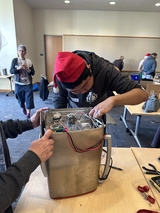With a broken toaster oven in hand, Courtenay Owens of San Mateo had come to the right place. "It has completely died," she explained. "No heat at all."

Owens was introduced to Frank Zhao, an electrical engineer by profession who repairs things for fun. Zhao removed the oven's side panel, revealing a nest of multi-colored wires and circuits. Time to get to work.
The place was a repair clinic organized by the County of San Mateo's Office of Sustainability. These regularly scheduled "fixit" clinics pair volunteer repair coaches who have specialty skills – electronics, small appliances, carpentry, needlecraft – with residents who have any number of broken things.
"These clinics really aim to help people repair their broken items before throwing them away into our landfills," said Shova Ale Magar, a sustainability specialist with the Office of Sustainability. "At the same time, it's a lot of fun. The volunteer fixit coaches enjoying sharing their knowledge and it really becomes a rewarding partnership to try to uncover what's broken and then fix it."
The clinics are part of a larger movement that aims to make repairing gadgets, clothing, electronics and more an easy choice. The South San Francisco Library, for instance, lends soldering kits and laser cutters; San Mateo County Libraries and Redwood City Public Library provide makerspaces with access to 3D printers and sewing machines.

People bring anything from cherished heirlooms to clothes to electronics. Events are held in local libraries and community centers.
There's no guarantee that items will be fixed. But volunteer coaches like Cindy Navarro, a former mechanic and registered nurse, cherish a challenge. "I like to work with my hands," she said.

On this day, she's repairing a small stool that came with the note, "Broken. Not sure if repairable. Did not want to dispose in case it is." (Yes, Navarro fixed it.)
Successful repairs are celebrated with a bell chime and applause.
Prior registration is required. That's so organizers can pair volunteer coaches with their specialty as well as pace the workload.
"Whether you fix it or not," attendees are advised, "you'll learn more about how it was manufactured and how it worked, ready to share your new-found skills and insight with friends, neighbors, and the community at large."
Volunteer coaches come from all backgrounds -- computer science, electronics, the construction trades as well as hobbyists.
Broken lamps, coffee makers and vacuum cleaners are among the items that top the list of things that need repair. Some see the clinics as a way to combat the consumer culture that seems to promote throwing out things and buying new over repairs.

According to the U.S. Environmental Protection Agency, the average person in the U.S. produces 4.9 pounds of trash per day, as of 2018. That's equates to about 147 pounds of trash per person per month, or 1,788.5 pounds per year. That's up from 4.4 pounds per person each day in 2013.
Many products (think almost any electronics) are manufactured in a way that makes it a mighty challenge to access key components. The volunteer coaches, Magar said, help give attendees the confidence to remove screws and panels.
"There are times when we have faced challenges in finding repair instructions for certain electronic items," Magar said. "With California's new legislation regarding the 'Right to Repair,' manufacturers are now required to provide manuals and parts for repair. This will enable us to successfully repair more items in our community. Hopefully, this law will create an environment encouraging to the growth of repair stores around the county."
Fixit Clinic Schedule
Jan. 20, 2024: 11 a.m. to 2 p.m. Location: Redwood City Public Library, 1044 Middlefield Road. Register here .
Feb. 3, 2024: 11 a.m. to 2 p.m. Location: Millbrae Library, 1 Library Ave. Register here.
March 27, 2024: 6:30 to 8:30 p.m. Location: Redwood City Public Library, 1044 Middlefield Road. Register here .
Interested in becoming a Fixit Coach? Fixit coaches provide participants with:
- Guidance on tools
- Encouragement owner to investigate their broken item.
- Let the participant talk about how they used it and how it broke. That often provides valuable hints as to what’s wrong.
- See how much you can do without actually handling the item. Empower the item’s owner to do the troubleshooting and disassembly.
- Register to be a coach here.
Michelle Durand
Chief Communications Officer
mdurand@smcgov.org
